Priyanka, 13 and a chirpy adolescent girl studying in a government school in a village called ‘Rohini Gaun’ 25 kms from Wardha in Maharashtra blushes and says, "We don’t talk about it at all!". That is how deep seated the taboo around menstruation is in rural India and our society as a whole, where mothers do not discuss it with their daughters or even among themselves.
It is something to be 'hidden' from each other and the men folk of the household as if it never happened! Priyanka gushes and says, "I got my menses when I turned thirteen few months ago and till that very time, I had no information about what menstrual cycle is." She says her mother told her nothing to prepare her for the change in her physiology and her life in general. "Menstruation onset turned my life upside down in more ways than one," Priyanka says regretfully, as if she felt she had been better off before it began.
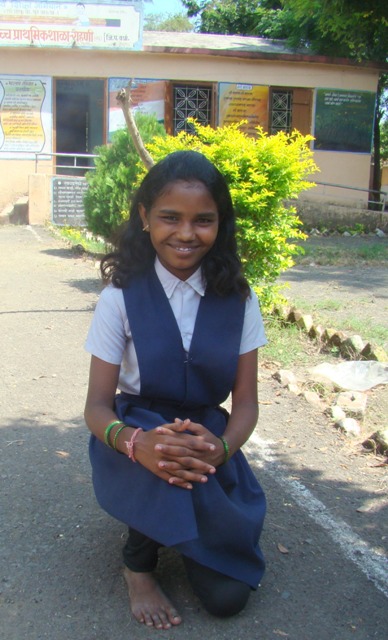
Priyanka
In rural India as a whole, menstruation is a taboo writ with stigma not permitting discussion or even information seeking. Because of the shame and superstitions associated with this monthly biological occurrence, these women are impacted by poor menstrual hygiene. On an average a woman has 3000 days of menstruation in her lifetime, which begins from 8-16 years and ends in her late forties or early fifties, with very real and practical needs like material for absorption of menstrual blood, facilities for proper disposal of used materials with privacy and dignity.
In a study by A.C Nielsen and Plan India it was found that 200 million people inIndiahave poor understanding of menstrual hygiene and linked health care; that only 12% of young girls and women have access to use sanitary pads; and 23% of girls in the country drop out of school after reaching puberty. This clearly indicates that the stigma, shame and superstition associated with menstruation has impacted menstrual hygiene and their general/reproductive health and impacted education among women.
Due to ignorance of health guidelines, no access to information stemming from the stigma to discuss it or their own geographical and cultural isolation, 300 million women and girls in India use unsanitary materials such as old rags, husks, dried leaves and grass, ash, sand or newspapers every month to try and contain the flow of menstrual blood. These unhygienic measures during menstruation makes women susceptible to infections and diseases, often requiring urgent medical attention. Urinary Tract Infections and other reproductive system diseases reducing mobility and livelihood opportunities in these women are impacts of stigma on menstruation.
Priyanka, sitting perched on her class bench along with other girls in her class, some of whom have begun menstruating informs us of just how superstition and stigma weaves a norm prevalent in her community. "My mother told me not to tell any one that I have begun having periods and she was very clear that keeping it away from the public eye was for my own good. Other people in the village must not come to know that I have now entered the 'marriageable age." (Puberty is considered to be the age where a girl inIndiacan be married off and in ruralIndiathis is still prevalent)
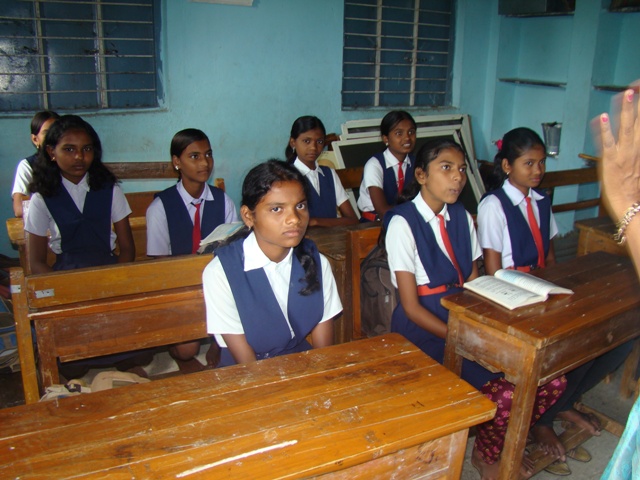
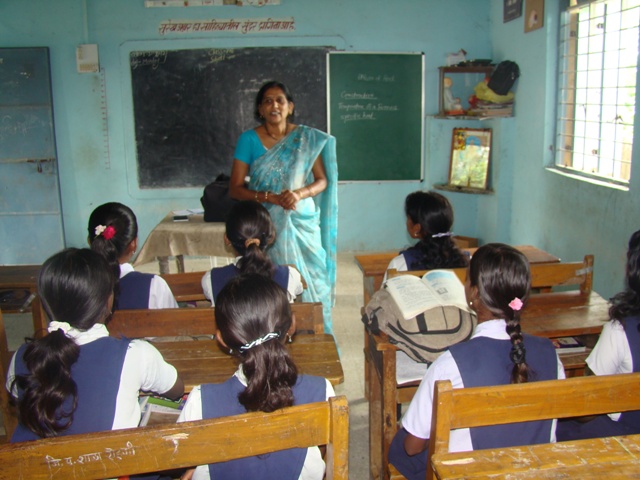
Left: Class in progress in rural Maharashtra; Right: The Wash Yatra Team with the class on menstrual hygiene
Priyanka lives a life of complete isolation the 3-5 days her menstruation lasts in a month. She is made to eat separately after other members of the household have eaten. She is not allowed into the house kitchen to help her mother with the cooking like other days, nor can she get herself something to eat or drink from the kitchen. She sits separately during the day and sleeps alone at night. She is barred from worshipping and entering the 'puja' room (a room or a side of the house assigned to worship and most Hindu houses have this clearly demarcated in their houses). "I don’t like these restrictions on me. I was better off before," she says.
Most other girls from her school and community use cotton fabric to absorb their menstrual fluid. This cotton fabric is mostly made out of old cotton saris (an Indian five yard long garment that women drape around themselves teamed with a blouse). Most of these girls don't know what a sanitary pad is and have never used one. And those who know about it have never considered it to be an option. Her classmate chips into our conversation and says, "We don’t have money to buy Whisper Wings. The advertisement on the television tells me how expensive they are! And besides that they are not available in the village."
The shame associated with washing these cotton strips of old saris stealthily shying away from the eye of others, drying them on clotheslines in the backyard or behind the door, and finally burning them after usage is the biggest deterrent to menstrual hygiene in ruralIndia. Until we have a plan to eradicate the superstition, stigma and shame linked with menstruation, the status of menstrual hygiene inIndiawill not see improvement.
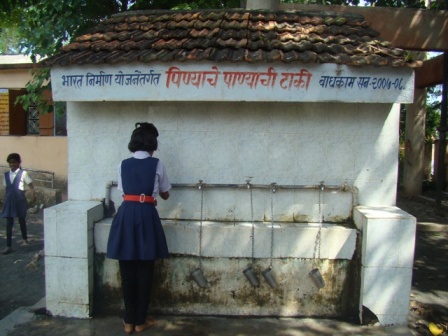
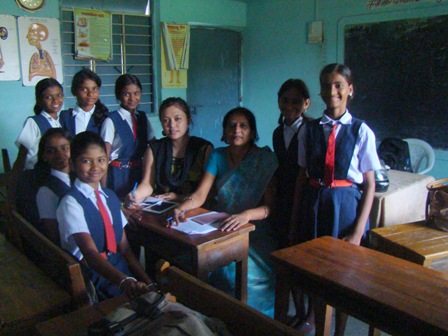
Left: Drinking water and hygiene in rural schools in Maharashtra; Right: Wash Yatra Team holds awareness drive & survey among adolescent girls
On Oct 1st 2012 in Wardha, Maharashtra began the Nirmal Bharat Yatra or the ‘Great Wash Yatra’, a travelling carnival that will travel for 50 days across five states of Maharashtra, Madhya Pradesh, Rajasthan, Uttar Pardesh and Bihar taking themed rides, games and performances seeking to promote awareness and behaviour change around sanitation and hygiene in India. An important component of the Yatra is talking to girls and their mothers and fathers, sisters and brothers, teachers and colleagues along the route of the Yatra, about menstruation without shame and embarrassment. The objective is to break the silence, to offer health guidelines on best practices for Menstruation Hygiene Management and to find solutions collectively. Water Supply and Sanitation Collaborative Council (WSSCC), a partner in this initiative, through the Yatra aims to bring the most rarely talked about subject of menstruation out of the dark.
It is yet to be seen if the Great Wash Yatra will reach out to the masses or not, but it certainly is a pioneer in taking an initiative deep into remote rural India and touching on aspects of water, sanitation and menstrual hygiene that have been buried under the load of stigma and ignorance. Girls like Priyanka and her classmates benefitted from the awareness program on menstruation hygiene held in her school in remoteMaharashtraby the Great Wash Yatra team. The mission of breaking stigma and superstition regarding menstruation has begun.
By Urmila Chanam
Fellow, India Water Portal, Arghyam
For full India Water Portal coverage of the Nirmal Bharat Yatra, click here.













